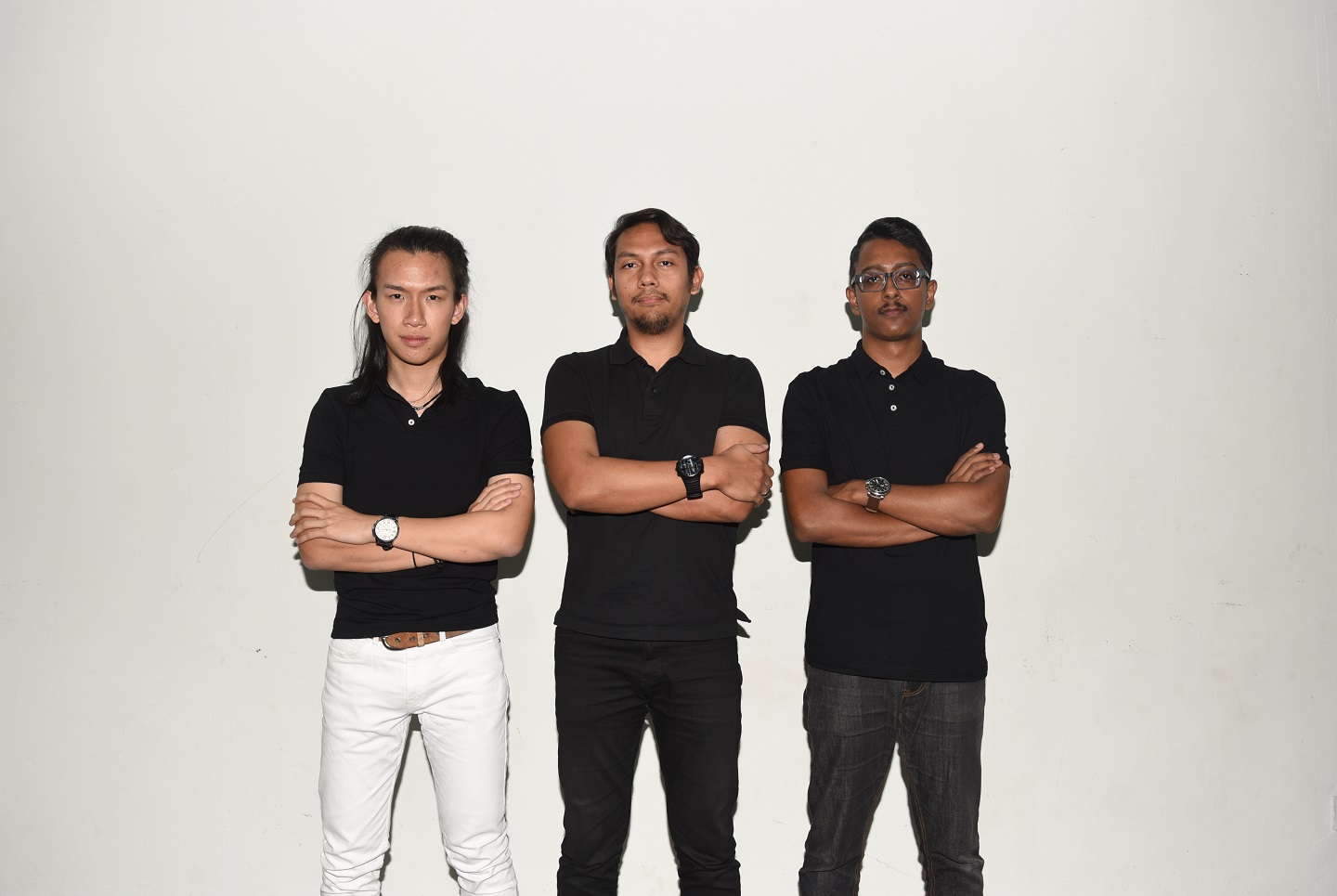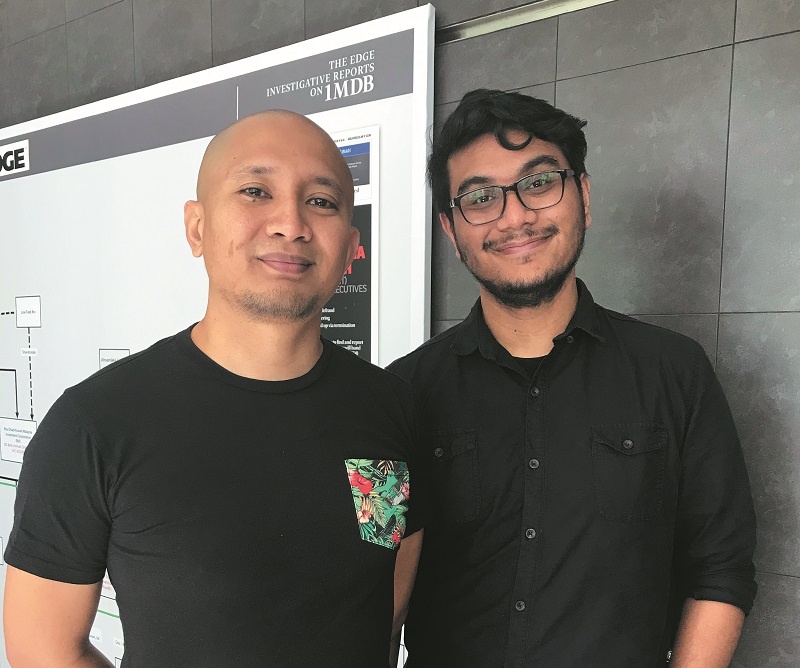
The play features a friendship between characters Danny, Ali and Ian. (Photo: Pohlithik)
A year after the unexpected success of IQ.Rock, an original story based on real events that happened in a FELDA settlement in rural Negeri Sembilan, the young theatre-makers championing contemporary Malaysian stories, Anomalist Production, return with yet another intriguingly titled stage play — Pohlithik.
A trilingual poetic drama with contemporary flair in the vein of the Broadway musical Hamilton, Pohlithik is co-written by Anomalist founder and stage director Khairi Anwar and spoken word poet Jamal Raslan.
The duo met while 27-year-old Khairi was still studying law at Universiti Teknologi MARA. Impressed when he saw Jamal perform during a festival, Khairi then proposed to work with the latter on a play about poetry. It was an idea that evolved after Khairi attended a talk by student activist Fahmi Redza, which inspired him to tell a story based on student activism, using poetry as the core of its expression.

“Fahmi had talked about student activism back in the 1960s to the 1980s, and I learnt how important a role that students played pre-May 13, 1969,” recounts Khairi. He refers to the events leading up to the violent incident that took place after the ruling Alliance lost many seats to the Opposition in a general election.
“University of Malaya students (specifically members of the University of Malaya Students’ Union, PMUM) back then had created a manifesto in the run-up to the 1969 election and were going around the country and holding rallies to engage both the public and all political parties, calling for them to endorse and adopt their manifesto. Because of them, politicians began coming up with their own manifestos, a few of them even adopting some of the UM students’ points. It also taught people to evaluate the party and not just their constituency candidates,” he says.
Pohlithik draws from that episode, as its writers re-imagined a time where students still had a voice and influence, and where the Universities and University Colleges Act 1971 — which was put in place in the aftermath to prevent students from being active in politics — did not take place.

The story itself has a seemingly contrived start, featuring a Malay student named Ali who meets his Chinese roommate, Danny, and they soon become friends with fellow student Ian, who is Indian. All three end up in a poetry club together, which becomes the catalyst for their sharing of personal ideas and viewpoints. The trio is spurred to action by a case of injustice and it draws the ire of an opposition politician who feels threatened by these students. This thrusts the boys into the world of politics with consequences that change their lives.
The decision to make it a multiracial representation was a deliberate one, Khairi explains: “A friend of mine, Nalini, who used to work in SUARAM (human rights organisation Suara Rakyat Malaysia), shared that when she was studying at Universiti Kebangsaan Malaysia (UKM) about five years ago, the colleges were segregated by race. She said the practice was probably so that it would be easier to manage the students, but it created a very divided student body.”
The depiction of race, and for that matter, the university within the play, is a symbolic mirror of Malaysia — and how her politics inevitably create racial sentiments.

This is the reason why the writers deliberately avoid going down that road for the play, even though it starts with that cliché. “In fact, none of the characters actually talk about race. It is always portrayed through external voices, be it the media or politicians. This was how it was in real life too. If you look at the PMUM manifesto presented in 1969, they presented seven points — democratic rights, economic improvement, health, agrarian reform, equal education for all, independent foreign policy, release of political detainees. None of it had anything to do with race,” Jamal clarifies.
Despite unfoding within a world where students have power of influence, Khairi and Jamal say Pohlithik is not a rose-tinted ideal. As they pay homage to the real-life student activists from 1969, namely key figures Khong Kim Hoong and Syed Hamid Ali — the latter was vilified by Tunku Abdul Rahman in his book as a communist and spent 15 years hiding in exile near the border of Thailand, interestingly, under the protection of the communist party who took him in even though they recognised that he was not one of them — they made sure to be truthful to what happens to those who dare stick their necks out.
Jamal says, “For me, the play is about consequences ... of having a voice and power. “You have to pay for using it. Pak Mid (Syed Hamid) lost his future because he stood for what he felt was right. In the play, the characters also realise the consequences of their actions. Not only for them, their loved ones too. It is poignant and can be conflicting, but it is a good reflection of reality.”

The pair are aware of how Pohlithik will be interpreted, from its title to its allusion of a controversial event in Malaysian history, not to mention the ongoing arguments about student activism. Despite the political issues it is tied to, they deny that the play is politically motivated.
“That in itself is a symptom of the problem we want to explore in this story — that for many, differentiating political issues and politics is near impossible. We discuss politics in the play, but we are not being political because we are not looking for power in this,” says Jamal.
Khairi agrees, “The aim is for students to know they have a voice — though it should not be for themselves but for others. And no, we are not telling them to go against the government. It is beyond that even, recognising the problem of not even being able to ask a question, or have a conversation. Funny thing is, most of our current politicians, like Datuk Seri Anwar Ibrahim, Tun Dr Mahathir Mohamad, Mat Sabu … They all started in university. So if the next generation is to get there, they should start now. But they lack that empowerment and that voice.”
In a way, Khairi and Jamal are doing their own brand of activism with Pohlithik, by giving a platform to something our culture has often shunned and shoved aside when it comes to difficult topics or conversation.
“Often something is started or said, but not seen through because of the labels that defeat it before a discussion can even take place — like the word power or even politics. People tend to jump the gun after hearing one trigger word. That is also why the poetry and poetic devices we have incorporated can help lower that barrier. By serving poetry in as many dishes as we can, from verse to rhymes, both abstract and as part of the narrative, paying homage to different poems, ‘remixes’ and even poetry slams, we can hopefully allow the messages and words to sink in more organically, giving us more of a chance to talk about it,” says Jamal.
'Pohlithik', Black Box, DPAC, Empire Damansara, PJ. Apr 24-28. RM55. See here for ticketing details.
This article first appeared on Apr 8, 2019 in The Edge Malaysia.


